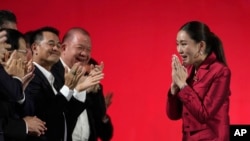The threat of censorship may soon be lifted from Thailand’s movie industry, as a new government pushes a "soft power” agenda to boost the kingdom’s potential as a creative hub.
Thailand was run for nine years by the arch-conservative government of former army chief Prayuth Chan-ocha, who seized power in a 2014 coup and presided over what rights groups say was a collapse in freedoms and restrictions on creative industries.
Antigovernment rappers and singers were hit with charges of sedition and royal defamation, while filmmakers and artists were put under surveillance, harassed by authorities or self-censored.
The new civilian government led by the Pheu Thai Party says it wants to foster a more open Thai society where creative organizations, including movie production companies, can flourish.
“Pheu Thai and coalition parties are ready to support freedom of expression,” Paetongtarn Shinawatra, chairwoman of the National Committee on Soft Power Development, said on Jan. 4. “Only movies with content that may affect the monarchy will remain prohibited from being screened in Thailand.”
A key part of the reforms is to establish a new censorship board, which is likely to include movie industry professionals and unspecified members from the private sector.
Experts say the reforms could swiftly end the culture of state censorship, which until now banned or edited films deemed to “undermine or disrupt social order and moral decency or that might impact national security or the pride of the nation.”
Television shows with LGBTQ+ themes and movies considered offensive to Buddhism have been banned or delayed for screening.
The horror movie “Shakespeare Must Die,” a reimagining of Macbeth by director Ing Kanjanavanit, has been banned since 2012 by the Thai government as a “national security threat.”
The movie referenced the October 1976 attack by police and right-wing paramilitaries on leftist protesters occupying Bangkok's Thammasat University. As many as 100 of the protesters were killed and the Thai military staged a coup immediately afterward, ending a brief period of democracy.
Ing’s 1997 film DogGod, portraying a cult following a dog, has recently been allowed to be screened after a decades-long ban.
The populist Pheu Thai Party is selling a new, liberal image of Thailand, as long as the monarchy’s central role remains untouched.
A so-called Soft Power Act will ultimately establish a creative agency to shape and promote what is produced in Thailand, from film to food and fashion.
“It’s a good start,” said Kong Rithdee, deputy director of Thai Film Archives, an agency responsible for promoting Thai cinema heritage.
“To do anything with the censorship law needs a lot of political will, because there’s always resistance from conservatives,” he said, adding that time will tell if the new censorship board ends the practice of banning challenging content.
“To drive a creative society, economy, they need to do away with censorship, work with a mentality of openness, allowing people to say and express what they want,” he said.
Movie critic Chayanin Tiangpitayagorn said he welcomes reform efforts but that there is still one exception.
“Lifting censorship should be wholesale,” he said. “The fact that they still consider banning content affecting the monarchy is like putting yourself in a straitjacket without the need to.”
Soft power politics
Paetongtarn, 37, is the daughter of Thaksin Shinawatra, Thailand’s former prime minister and founder of the Thai Rak Thai party, which became today’s Pheu Thai Party. In August 2023, he made a surprising return to Thailand after 15 years in self-exile — in the same week that Pheu Thai came to power.
The coalition that Pheu Thai forged with several conservative parties from the previous administration froze out the more radical and youthful Move Forward Party, despite Move Forward winning the public vote.
Pheu Thai is now trying to win over that younger demographic by reforming conservative laws, including pushing for a same-sex marriage bill and easing film censorship.
Paetongtarn's agenda is inspired by South Korea’s strategic state-backing of its own culture that launched the Korean Wave cultural phenomenon of K-pop music and K-dramas that are popular around the globe.
The relaxation of Thai censorship will be “a slight improvement,” said filmmaker Aekaphong Sarasante, who is waiting for the changes before he releases his documentary "Breaking the Cycle," about the rise of Thailand’s new political youth force, for screening.
“But I’m disappointed that it all happens only for political gain,” he said.
Meanwhile, the core purpose of soft power to elevate a nation’s profile has been diluted, critics say, despite a $140 million budget and the promotion of Paetongtarn as the plan’s spokesperson.
Voranai Vanijaka, a lecturer in journalism at Thammasat University and a former political candidate, says how free Thailand’s cultural scene is comes with an asterisk.
“The only way to know how much freedom we will have is to know the makeup of the censorship board,” he said. “How many from the private sector? How many from the government sector? Who has more weight? Who has more power?”




